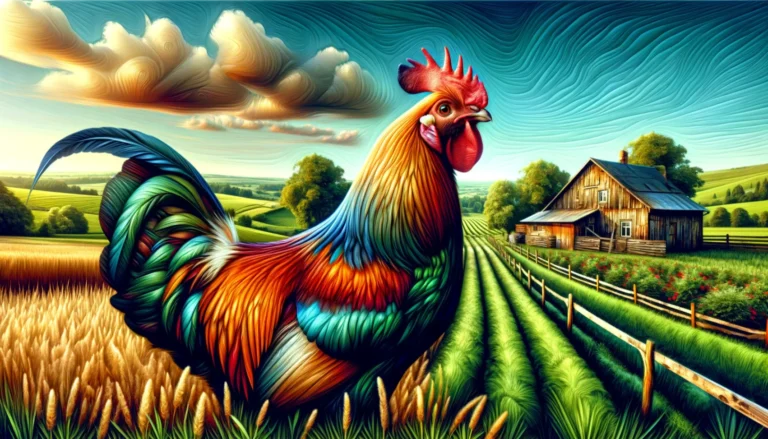Sultan Chicken Symbolism and Meaning

The Sultan chicken is a rare, ornamental breed known for its unique appearance and cultural symbolism. In this blog post, we’ll explore the origins, physical traits, and symbolic meanings associated with this eye-catching fowl. Whether you’re an avid poultry keeper or simply interested in animal symbolism, read on to learn more about this distinctive bird.
Origins and History
Sultans are an ancient breed originating from Turkey, where they were kept as ornamental birds by Ottoman sultans. Their history traces back over 700 years to the days of the Ottoman Empire.
Selective breeding over centuries has produced the Sultan’s distinctive physical traits. The breed spread across the world through trade routes like the Silk Road and is now kept internationally. However, global numbers are still small, classifying Sultans as a rare breed.
Physical Characteristics
Sultans have several traits setting them apart from other chicken breeds:
- Feathered Feet and Legs – Rather than scales, Sultans have long, feathering covering their feet and legs. This gives them a unique, fluffy-footed appearance.
- V-Shaped Comb – Their comb is small and V-shaped rather than upright.
- Five Toes – Most chickens have four toes, but Sultans have five on each foot.
- Beard and Muff – Both hens and roosters sport a “beard” of feathers under their beaks. Hens also have a “muff” of facial feathers.
- Vibrant, Iridescent Plumage – Sultans display a rainbow of iridescent feathers in colors like emerald, cobalt, or ruby.
Their ornamental traits are the result of selective breeding rather than natural evolution. For example, the feathered feet likely arose from a genetic mutation.
Symbolic Meaning
Beyond physical attributes, the Sultan chicken holds deep cultural symbolism:
Wealth and Status
Due to their history with Ottoman rulers, Sultans represent wealth, power, and nobility. Keeping these rare, ornamental birds was a status symbol afforded only by elites.
Even today, their lush plumage and regal appearance reflect high status. Sultans are prized more as ornamental show birds than productive egg layers or meat birds.
Spiritual Guidance
In some Southeast Asian cultures, Sultans symbolize spiritual protection and guidance. Their connection with sultans and kings transfers those noble qualities.
Red Sultans specifically represent sacred guidance, as their vibrant color connects them with the Hindu deity Garuda.
Fertility and Abundance
Across many cultures, chickens represent fertility, nurturing, and abundance. The Sultan’s maternal instincts and dedication to hatching and raising chicks align with these qualities.
Their lush feathers can also symbolize the richness and abundance of the earth’s bounty.
Conclusion
Whether you’re delving into animal symbolism or simply admiring their beauty, Sultan chickens offer much to explore. From their long history with sultans to their vibrant feathers and fluffy feet, everything about this breed captivates the imagination.
If you found this glimpse into Sultan chicken symbolism interesting, let me know in the comments below! I’m happy to cover more obscure chicken breeds and their meanings in future posts.
Key Takeaways:
- Sultans originate from ancient Turkey and were kept by Ottoman rulers
- Distinct physical traits like feathered feet come from selective breeding
- Symbolism includes wealth, spiritual guidance, fertility, and abundance
- Sultans remain a rare ornamental breed prized for appearance overproduction





